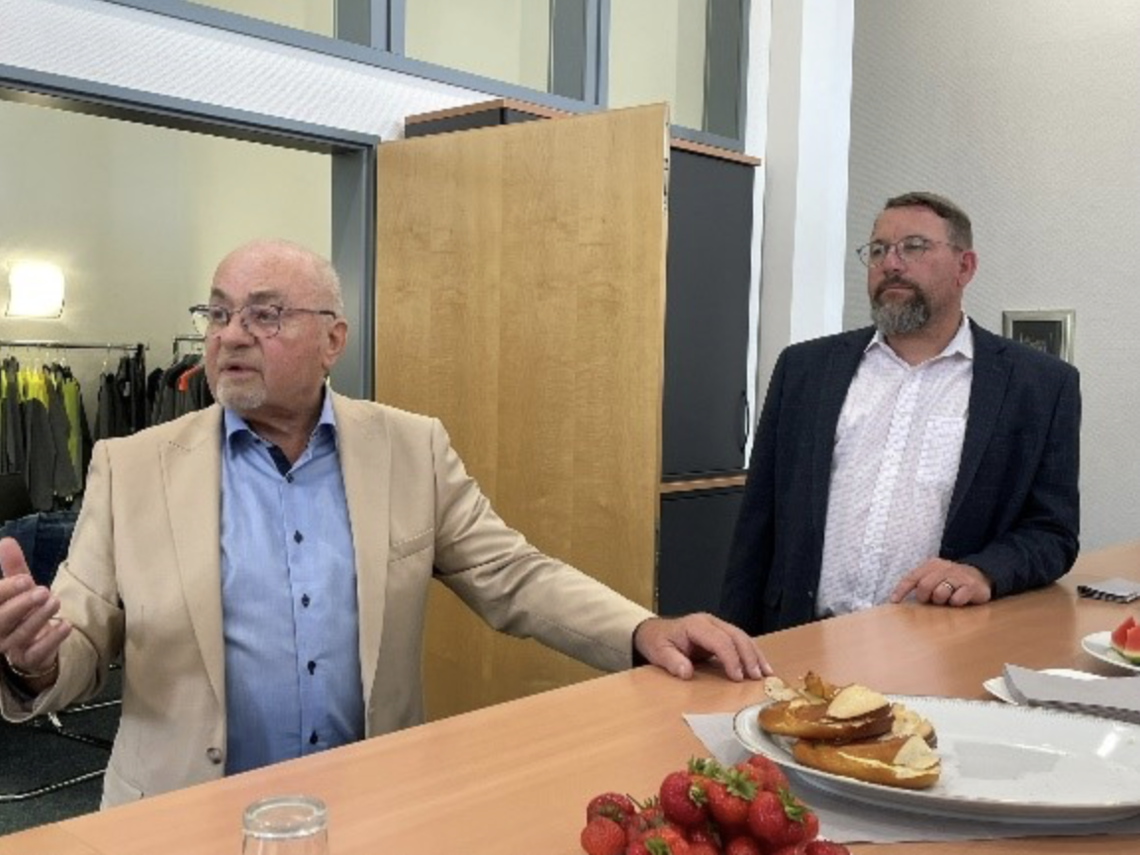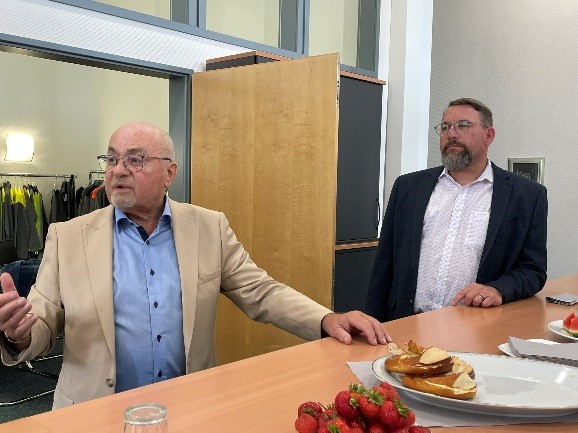
Lichtenstein, Germany, August 21, 2024 – Fuchshuber Techno-Tex celebrates its fortieth anniversary this summer. On July 24, 1984, Friedrich Fuchshuber founded his company in Lichtenstein-Unterhausen. He was the guest of honor at an anniversary celebration of Fuchshuber Techno-Tex, which for some years has been a member of the Belgian Concordia Group. The founder took his audience back to the firm’s roots—protective clothing for use in the sport of fencing—and outlined its progress toward the focus of Fuchshuber Techno-Tex today on high-performance textiles for both body protection and technical applications.
The Name on the Door
“Your name accompanies us daily,” Rüdiger Reuter, CEO of Fuchshuber Techno-Tex, said with a smile as he presented the firm’s founder at the anniversary event. “Whether we say who we are on the phone or make an offer with our letterhead, Fuchshuber is ever present.”
Possibility Meets Opportunity: Fencing Suit Made of Knitwear
In 1984 Friedrich Fuchshuber, with a qualification in industrial business management and a diploma in textile and process engineering, founded Fuchshuber Techno-Tex GmbH. His previous employer, the Unterhausen Cotton Spinning Mill (BSU AG), was liquidated by a new shareholder and production was relocated. Fuchshuber, who had been an authorized signatory and member of the management, was then able to fulfill a longstanding wish and found a company of his own.
The entrepreneur had already set his sights on the demand for fencing suits, which until then had been made of woven fabric and did not permit much freedom of movement. In addition, resistance to penetration had not yet been set at 800 Newton and a testing device had yet to be specified. “You clamped a sabre in place, hit on it with the material and then there was a hole,” Fuchshuber recalls. Initially at least, but Friedrich Fuchshuber persisted, improving the material until there no longer was a hole. “That was a breakthrough,” he says. At the same time the Textile Research Institute in Denkendorf developed a testing device and specified a resistance to penetration.
“The Trousers Flew Right Across the Room”
Fuchshuber’s fencing sportswear did not need to pass a standardized test as far as the fencers were concerned. He remembers how he presented his fencing trousers made of elastic knitwear at the Fencing Center in Tauberbischofsheim and another company presented the same product made of woven fabric. Fencing coach Emil Beck’s reaction was unequivocal, Fuchshuber says: “He threw the woven trousers right across the room, shouting ‘I’m not letting my fencers have their extremities strangulated!’”
250,000 Gloves for the U.S. Army
There is a place for protective clothing in more than sport, Fuchshuber was quick to realize. The police, border force, fire service, disaster relief workers and of course the Bundeswehr needed protective clothing that was cut- and puncture-resistant, flame retardant, robust and, last not least, comfortable.
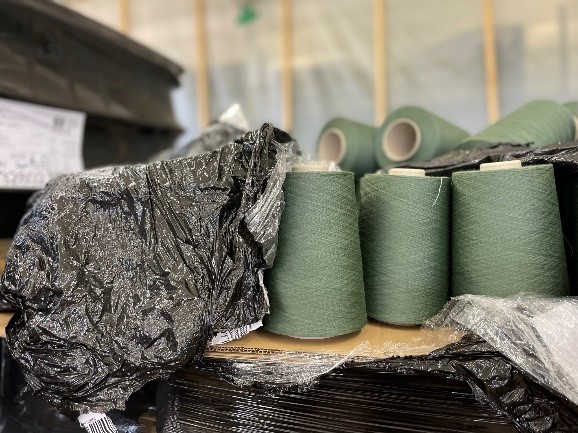
Friedrich Fuchshuber already had a business relationship with DuPont, the manufacturer of various high-performance fibers such as Nomex® and Kevlar®. Orders were also to be found, but they frequently presented serious challenges for the young enterprise. The U.S. Army ordered 250,000 pairs of airmen’s gloves, for example. “I had sleepless nights as we approached the agreed delivery date and the material failed to fulfill the required combustion behavior,” he remembers. “At the same time our garment makers were already using the material because we were pressed for time.” In the end the desired dye was found to be to blame for the combustion behavior and Fuchshuber was not responsible for it. “So, the entire order was accepted, which was a great relief for all of us.”
Knitting Mill in a Cowshed
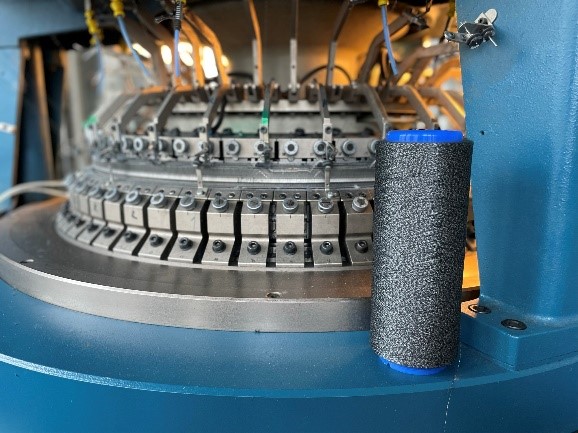
Along with a reliable spinning mill with which Fuchshuber was already collaborating, a knitting mill of his own was a keystone of the virtual full integration that he had in mind. He found it in the Swabian Alb region in a “whitewashed cowshed that until recently had still housed cows.” “The farmer’s circular knitting machines later went to a knitting mill in Balingen that Fuchshuber took over when it filed for insolvency in 2010. The dye works and finishing was a further stage in the value chain. He was able to integrate customization via partners in Czechia and Bulgaria. That was how Fuchshuber managed to market protective equipment in his own distinctive name.
Fuchshuber as a Member of the Concordia Group
In 2016 Friedrich Fuchshuber sold his company to the Concordia Group. He had advised possible successors—his sons—not to pursue a career in the textile industry. The connection with Concordia came about via the fiber manufacturer DuPont. “That was a very good solution for several reasons,” Fuchshuber is convinced. It was a seamless transition for the workforce in Lichtenstein because the jobs were preserved at both Admin in Lichtenstein and the knitting mill in Balingen-Frommern. The same applied to longstanding customer relations and valuable knowhow. “For Concordia, Fuchshuber with its knitting-based technical textiles was a valuable addition to its portfolio. Concordia’s ability to assert itself in this market has grown much stronger as a consequence.”
Due to its own woven goods production Concordia has for many years been active in the military and police market segments. Fuchshuber’s knitwear rounded its program off ideally.
Wide-ranging Areas of Use for Protective Clothing
Fuchshuber now has a payroll of around 14, including four employees at the in-house knitting mill in Balingen. In terms of virtual full integration and the entire value chain, around 60 people contribute their labor.
Fuchshuber processes roughly a third of the production itself, supplying police forces and fire services in particular with fleece and coarse piqué-structured jackets or flame-retardant underwear. Flame-retardant balaclavas worn under the helmet are another in-house development. Fuchshuber markets its own Cutex brand of protective clothing for the glass- and metal-processing industry. It is cut- and coating-resistant and made of heat-resistant aramid fiber.
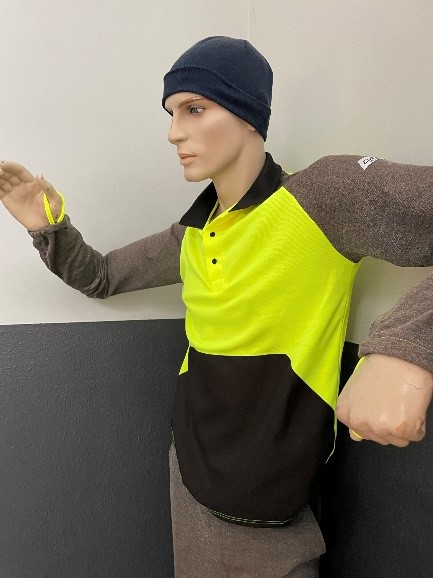
Most of Fuchshuber’s special knitwear goes to partners who insert it into suits, trousers or gloves. Customers include the Bundeswehr, police and special forces as well as the fire and rescue services. Fuchshuber continues to be a major supplier to sport. Ice hockey players, ice speed skaters and skiers need protection from cuts and abrasion injuries. A small but significant area of use is psychiatry, which requires bite- and cut-proof fabrics for straitjackets.
Fuchshuber with its portfolio is one of the leading providers in Europe. It contributes around six million euros toward Concordia’s sales. The Group’s 2023 sales totaled € 100 million.
About Fuchshuber Techno-Tex GmbH

Fuchshuber Techno-Tex GmbH manufactures high-performance articles for body protection and technical uses. Its portfolio consists of the Cutex collection for stab and cut protection, heat and flame protection, high-performance technical knitwear for use in hospitals and psychiatric clinics and high-performance fabrics for customer-specific uses. The company is based in Lichtenstein near Reutlingen and has a payroll of 14 employees. Fuchshuber Techno-Tex was founded in 1984 by Friedrich Fuchshuber and has since 2017 been part of the Belgian Concordia Group, which comprises workwear, fashion, bed linen and special solutions divisions.
